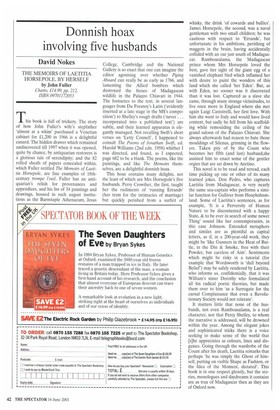Donnish hoax involving five husbands
David Nokes
THE MEMOIRS OF LAETITIA HORSEPOLE, BY HERSELF by John Fuller Chatto, £14.99, pp. 212, ISBN 09701172053 This book is full of trickery. The story of how John Fuller's wife's stepfather 'almost at a whim' purchased a Venetian cabinet for £1,200 in 1966 is a delightful canard. The hidden drawer which remained undiscovered till 1997 when it was opened, quite by chance, by antiquarian restorers is a glorious tale of serendipity; and the 82 rolled sheafs of papers concealed within, which Fuller retitled The Memoirs of Laetitia Horsepole, are fine examples of 18thcentury trompe l'oed. Fuller has an antiquarian's relish for provenances and appendices, and his list of 34 paintings and drawings, housed in such august institutions as the Barnstaple Athenaeum, Jesus College, Cambridge and the National Gallery is so exact that one can imagine the editor agonising over whether Piping Aboard can really be as early as 1766, and lamenting the Allied bombers which destroyed the fresco of Madagascan wildlife in the Palazzo Chiavari in 1944. The footnotes to the text, in several languages from Du Fresnoy's Latin ('evidently inserted at a late stage in the MS's composition') to Shelley's rough drafts (never . . incorporated into a published text') are subtle, and their learned apparatus is elegantly managed. Not recalling Swift's short verses on 'Lefty Connell', I happened to consult The Poems of Jonathan Swift, ed. Harold Williams (2nd edn. 1958) whither I was directed, and found, as I expected, page 682 to be a blank. The poems, like the paintings, and like The Memoirs themselves, are a delightful donnish hoax.
This hoax contains many delights, not the least of which are Mrs Horsepole's five husbands. Perry Crowther, the first, taught her the rudiments of 'running Errands' (her term for the intimacies of marriage) but quickly perished from a surfeit of whisky, the drink 'of cowards and bullies'. James Horsepole, the second, was a naval gentleman with two small children; he was cautious with respect to 'Errands', but unfortunate in his ambitions, perishing of maggots in the brain, having accidentally collided with an oar just south of Madagascar. Ramboasalama, the Madagascan prince whom Mrs Horsepole loved the best, gave her sight of the giant egg of a vanished elephant bird which inflamed her with desire to paint the wonders of this land which she called 'her Eden'. But, as with Eden, no sooner was it discovered than it was lost. Captured as a slave she came, through many strange vicissitudes, to live once more in England where she met again Luigi Canistrelli, her first love. With him she went to Italy and would have lived content, but sadly he fell from his scaffolding while remoulding the ceiling of the grand saloon of the Palazzo Chiavari. She always afterwards had reason to hate those mouldings of Silenus, grinning in the flowers. Taken pity of by the Count who becomes her fifth (and last) husband,she assisted him to enact some of the gentler orgies that are set down by Aretino.
This novel is to be read and reread, each time picking up one or other of its many learned jokes. Don Pedro, who captures Laetitia from Madagascar, is very nearly the same sea-captain who performs a similar function for Gulliver from Houyhnhnmland. Some of Laetitia's sentences, as for example, 'It is a Perversity of Human Nature to be discontented with a happy State, & to be ever in search of some newer Thing' sound like her contemporaries, in this case Johnson. Extended metaphors and similes are as plentiful as capital letters, as if, in a 200-year-old work, they might be 'like Gunners in the Heat of Battle, in the Din & Smoke, free with their Powder, but careless of Aim'. Sentiments which might be risky in a tutorial (for example that Wordsworth is 'dull beyond Belief) may be safely rendered by Laetitia, who informs us, confidentially, that it was William's sister Dorothy who formulated all his radical poetic theories, but made them over to him 'as a Surrogate for the carnal Complaisance that even a Revolutionary Society would not tolerate'.
It matters little that none of the husbands, not even Ramboasalama, is a real character, nor that Percy Shelley, to whom the narrative is addressed, will be drowned within the year. Among the elegant jokes and sophisticated tricks there is a voice seeking to make sense of the world that [s]he appreciates as colours, lines and disguises. Going through the wardrobe of the Count after his death, Laetitia remarks that perhaps 'he was simply the Ghost of himself, putting on visible Shape as Fashion, or the Idea of the Moment, dictated'. This book is in one respect ghostly, but the stories, monologues and daydreams it contains are as true of Madagascar then as they are of Oxford now.


































































 Previous page
Previous page